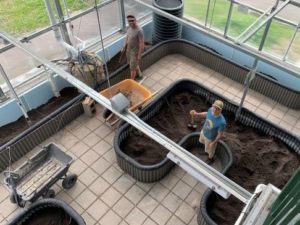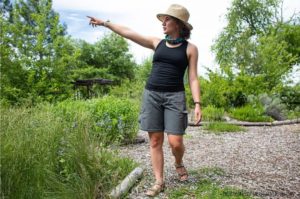By Althea Hogle
It’s the late afternoon in a windowless room staring at a PowerPoint presentation. The teacher all of the sudden starts to sound like the adults in Charlie Brown.” Whaaa. Wa. waa. Wa whaaaa…” they are teaching something seemingly mundane in relation to the really groundbreaking sounding title of the class. You find yourself daydreaming and thinking… “I am never going to use this information. It’s boring and I will never do anything so mundane in my life.” I would think we have all experienced something similar to this in an educational setting. If not… good for you! This unfortunately was a thought I had frequently through both high school and college. It was usually centered on coursework in math and science that I found both challenging and uninteresting. Almost as if I was so delusional to think I could pick the sexy parts of science and leave the calculations and analytical work behind. Nope, they go hand in hand. A lesson I have found post- college in the work force and especially during my term of service.
In school I studied Agroecology, a very broad yet specific field with many scientific concentrations applied to agricultural systems. By definition: The study of ecological processes applied to agricultural production systems. Bringing ecological principles to bear can suggest new management approaches in agroecosystems. (The term is often used imprecisely…)
During my time in school I ran towards the plant ecology side of the program and shied away from the “hard science” side like chemistry and soil science, however I had to face those challenging subjects before too long. In many of those classes I just barely got through due to my own mental blocks. Constantly telling myself… “I am never going to use this information again.”
Well here I am years later, finding myself applying the very practices, theories, sciences etc… to very real and very important dilemmas here at the Center for Sustainability and Entrepreneurship (CSE). The issue I am speaking of is an issue with contaminated soil in the CSE Greenhouse. In 2018, the Whitefish High School (WHS) Center for Sustainability and Entrepreneurship noticed plant symptoms in their greenhouse consistent with herbicide injury from persistent herbicides.
After soil testing, aminopyralid was discovered in the soil. For a basic understanding of the Aminopyralid pesticide please see: https://www.beyondpesticides.org/assets/media/documents/infoservices/pesticidesandyou/documents/aminopyralid.pdf. The Whitefish High School turned this into a teaching and learning opportunity for their students and set up a project to determine how they may remediate the soil in their greenhouse. Students researched potential remediation techniques and plots were treated over a three-month period. Many of the plots used a cover crop mix consisting of sunflower, oat, pea, and radish.
While this project was a fantastic learning experience for students the matter of contamination was never truly solved. In the wake of a previous employee stepping out and leaving many holes in reporting and data, I came to the CSE with the assumption that the soil had been remediated. Although as time went on I began to notice signs that the problem in fact had not been solved. The past few months I have been doing my own tests and working closely with the Montana Department of Agriculture to gather the full analytical reports in order to understand the history of the problem and to know how to move forward. As a group we came to the conclusion that replacing the soil rather than reclaiming it was our best option. In order to get to this decision I used the science I told myself I would never use. And to my surprise I found the whole situation exciting, relevant, and rewarding. To the point that I am interested in further investigation of how small scale agricultural systems are affected by these chemistries. I see how little actual knowledge there is as an interesting jumping off point. College me may have rolled her eyes if I told her that. If I could, I would love to go back and tell that 20 year old me to be patient and to listen and to give my professors more credit because I will learn many things and use them when I least expect it.
When will you use what you are learning in your classes? I don’t know. No one does. Is it worth learning even if we don’t see an immediate application to something you are interested in? Probably, because most knowledge gets applied to situations we never anticipated or to situations in which we don’t even realize what knowledge we are using. This is a situation in which we ask that you have a little faith in those who have gone before you and are teaching you. It pays to learn all you can about all you can. Of course, you can’t learn everything, but the more you learn, the better judge you can be of what is worth learning. Exactly how you benefit from what you learn will best be seen by connecting the dots backwards.









